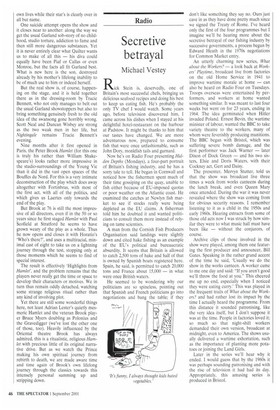Secretive betrayal
Michael Vestey
Rick Stein is, deservedly, one of Britain's most successful chefs, bringing us delicious seafood recipes and doing his best to keep us eating fish. He's probably the only TV chef I would watch. Some years ago, before television discovered him, I came across his dishes when I stayed at his delightful hotel-restaurant on the harbour at Padstow, It might be thanks to him that our tastes have changed. We are more adventurous now, prepared to consume fish that were once unfashionable, such as John Dory, monkfish tails and gurnard.
Now he's on Radio Four presenting Hidden Depths (Mondays), a four-part portrait of Britain's fishing industry, and he has a sorry tale to tell. He began in Cornwall and noticed how the fishermen spent much of their time gossiping on the quay, unable to fish either because of EU-imposed quotas or poor weather on the Atlantic coast. He examined the catches at Newlyn fish market to see if stocks really were being depleted as the EU claims. A fisherman told him he doubted it and wanted politicians to consult them more instead of relying on tame scientists.
A man from the Cornish Fish Producers Organisation said landings were slightly down and cited hake fishing as an example of the EU's political and bureaucratic absurdity. It seems that Britain is allowed to catch 2,500 tons of hake and half of that is owned by Spanish boats registered here. Spain, he said, is permitted to catch 20,000 tons and France about 15,000 — in what were once British waters.
He seemed to be wondering why our politicians are so spineless, pointing out that Spanish and French politicians go into negotiations and bang the table; if they don't like something they say no. Ours just cave in as they have done pretty much since we signed the Treaty of Rome. I've heard only the first of the four programmes but I imagine we'll be hearing more about the secretive betrayal of our fishing industry by successive governments, a process begun by Edward Heath in the 1970s negotiations for Common Market entry.
An utterly charming new series, What about the Workers? — a look back at Workers' Playtime, broadcast live from factories on the old Home Service in 1941 to improve wartime morale at home — can also be heard on Radio Four on Tuesdays. Troops overseas were entertained by performers, and workers at home wanted something similar. It was meant to last four weeks but went on for 23 years, ending in 1964. The idea germinated when Hitler invaded Poland. Ernest Bevin, the wartime minister of labour, wanted the BBC to take variety theatre to the workers, many of whom were feverishly producing munitions. The BBC began with Bristol, which was suffering severe bomb damage, and the first performer was Jack Warner — later Dixon of Dock Green — and his two sisters, Elsie and Doris Waters, with their Cockney act, Gert and Daisy.
The presenter. Mervyn Stutter, told us that the show was broadcast live three times a week from works canteens during the lunch break, and even Queen Mary once attended. During the war it was never revealed where the show was coming from for obvious security reasons. I remember listening to it as a child in the 1950s and early 1960s. Hearing extracts from some of those old acts now I was struck by how similar they were to what music hall must have been like — without the conjurors, of course.
Archive clips of those involved in the show were played, among them one featuring the first producer and announcer, Bill Gates, Speaking in the rather grand accent of the time he said, 'Usually we do the show in the works canteen. A worker came to me one day and said: "If you aren't good we'll throw the food at you." This cheered me up no end, especially when I noticed they were eating curry.' This was played in the frequent trails of What about the Workers? and had rather lost its impact by the time I actually heard the programme. From this distance it sounded patronising, like the very idea itself, but I don't suppose it was at the time. People in factories loved it; so much so that night-shift workers demanded their own version, broadcast at midnight, even to America. The shows usually delivered a wartime exhortation, such as the importance of planting more potatoes or joining the Land Girls.
Later in the series we'll hear why it ended. I would guess that by the 1960s it was perhaps sounding patronising and with the rise of television it had had its day. Appropriately, this amusing series is produced in Bristol.


























































 Previous page
Previous page